The official text displayed on the website and in all materials is the English version of the RAN website. Translations are provided as a service to users of the RAN website. If any questions arise concerning the accuracy of the information presented by the translated version of the website or any material, please refer to the English version, which is leading.
Filter by
RAN Publications (243)
RSS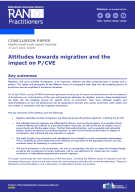
The paper presents the key outcomes of the meeting between a group of RAN Practitioners and a small group of experts and practitioners, which took place on 19 April 2024. The aim was to broaden our understanding of how anti-immigrant attitudes...
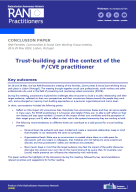
The paper presents the key outcomes of the RAN Practitioners meeting of the Families, Communities & Social Care Working Group which took place in Lisbon, Portugal, on 28 and 29 May 2024.
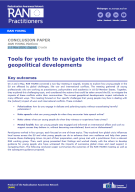
The paper presents the key outcomes of the RAN YOUNG meeting that took place on 2-3 May 2024 in Zagreb, Croatia.
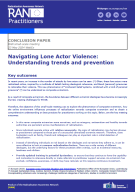
The paper presents the key outcomes of the RAN small-scale meeting that took place on 23 May 2024 with the aim of exploring the phenomenon of composite extremism.
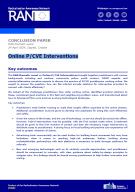
The paper presents the key outcomes of the RAN thematic event on Online P/CVE Interventions that took place on 24 April 2024 in Zagreb, Croatia.
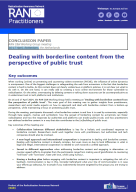
This paper first covers the highlights of the discussions and presentations that were given during the meeting, followed by an outline of the case study action plans that the participants worked on during the meeting.
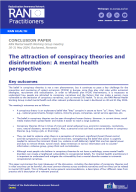
The paper presents the key outcomes of the RAN Mental Health Working Group meeting that took place on 30-31 May 2024 in Bucharest, Romania.
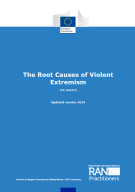
This consolidated paper provides a brief non-exhaustive summary of the root causes and factors that can lead to violent extremism.
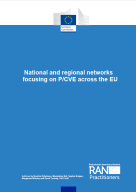
This paper presents the results of the mapping of national and regional networks working on preventing and countering violent extremism (P/CVE) in the EU.
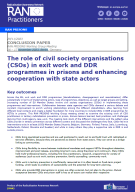
The paper presents the key outcomes of the RAN PRISONS Working Group meeting that took place on 16-17 November 2023 in Berlin, Germany.
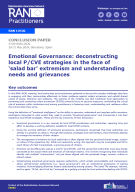
The paper describes the outcomes and conclusions of the RAN Local meeting that took place on 30-31 May 2024 in Barcelona, Spain, where local authorities and practitioners gathered to discuss the complex challenges they face in engaging with their communities...
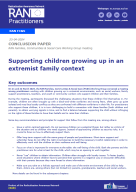
The paper presents the key recommendations and principles for support that follow from the RAN Families, Communities & Social Care (FC&S) Working Group meeting that took place on 21 and 22 March 2024.
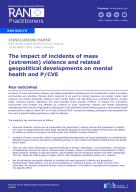
The paper summarises the main takeaways of the RAN Mental Health WG meeting, which took place on 19-20 March 2024 in Lisbon, Portugal. Key points include the impact of incidents of mass (extremist) violence and related geopolitical developments on society, community and individuals...
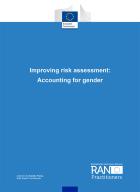
This specialised paper explores the reason(s) why gender should be a consideration in risk assessment. Before addressing this issue, the paper attempts to differentiate between two main aspects of our underlying understanding of gender: ‘women’ and ‘gender roles’.

The paper delves into the concept of violent extremism within the Western Balkans, offering insights into the historical backdrop. It also provides an overview of deradicalisation, disengagement, and resocialisation practices, highlighting the challenges and gaps...

The paper captures the main insights from a RAN Practitioners study visit to the Union of Flemish Cities and Municipalities in Brussels on 13 December 2023, where expert participants from a number of EU MSs and other European countries discussed the challenges connected to the safe repatriation...
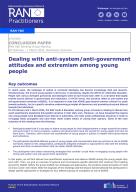
On 29 February and 1 March 2024, the RAN Youth & Education working group convened a meeting to discuss how youth practitioners experience anti-system and anti-government extremism (ASAGE) in their daily work. This paper presents an overview of some of the main outcomes of the meeting.
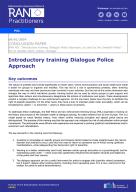
The paper presents the key outcomes from the training organised by the RAN Police and law enforcement Working Group (POL) on the theory and practice of the Swedish model of dialogue policing, for police officers from all over Europe.
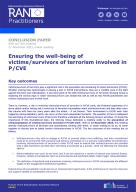
This paper summarises the discussion at the RAN VoT WG meeting that took place on 21 November 2023, starting with a short description of the key points and following up with a list of recommendations.
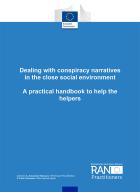
Conspiracy narratives can pose a threat to liberal democracies, as observed in numerous Member States of the EU. This paper aims at supporting practitioners in the social services sector as well as practitioners in general who have family members and friends affected by such narratives.
